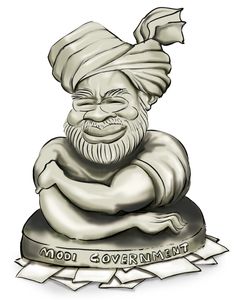This sms is doing the rounds: “The Congress brought Modi to power. It is the BJP that will kick him out!”
Modi is a great believer in centralisation and authoritarianism. He is not running the Modi government. He is the Modi government. The administrative dictatorship is best exemplified in the official orders issued by the cabinet secretariat pertaining to the allocation of business among ministers. In addition to usual departments always held by the prime minister―atomic energy, space, personnel―the orders add that “all important policy matters” also fall in Modi's exclusive domain. Thus, the hallowed principle of the prime minister being no more than the first among equals is given the go-by and all that matters is assigned to one man. A man who distinguished himself in Gujarat by being a law unto himself.
Also consider that virtually every economic ministry has been put in the charge of a minister of state, not a cabinet minister. Thus, by default, the prime minister becomes minister for planning, minister for commerce and industry, minister of environment and forests and a sheaf of other such portfolios. His trusted coterie of Jaitley (his most ardent supporter over the Gujarat pogrom), Gadkari and (the late) Gopinath Munde got their due, as did some others like Ashok Gajapathi Raju, the civil aviation minister. The latter got so because he was a key alliance partner. Everything else is concentrated in one pair of hands. And even when it is not, as in the case of external affairs, the sidelining of Sushma Swaraj for and on the foreign jaunts of our peripatetic prime minister has become downright embarrassing.
The greats of the BJP past are left to nurse their grievances on the margin. The saddest of these is Lal Krishna Advani, founder member of the Bharatiya Jana Sangh, deputy prime minister and BJP candidate for prime minister in 2009. In astonishing good health at his advanced age, Advani saved Modi’s neck in the aftermath of the post-Godhra riots, but has not survived Modi’s ire at allowing a discussion on his failings in Parliament in order to facilitate the budget being discussed. Murli Manohar Joshi is out for the sin of having been a past president of the BJP and liable to have views of his own. Others paying the price for having riled Modi at the time of Gujarat 2002 include Vajpayee, for having compelled Modi to pay his first-ever visit to a Muslim refugee camp one month after the riots broke out; Arun Shourie, for having emerged as Vajpayee’s principal confidant over Gujarat, and Jaswant Singh, for having hinted that there might, after all, be some good to Jinnah. All pushed into the outer darkness so that they might not dim the sun of Modi.
Now, the state leaderships are being shown their place. By not naming in advance the BJP’s candidates for chief minister of Maharashtra or Haryana, and taking upon himself the mantle of chief campaigner, Modi intends to ensure that if the BJP does come to power in these states, the chief ministers will not become independent poles of authority like Shivraj Chouhan or Raman Singh. While underplaying the role of these two stalwarts in the 2014 elections, Modi is now on track to show that after three successive setbacks in polls after the triumph of May 2014, Maharashtra and Haryana have fallen into the BJP lap because of Modi and Modi only.
Therefore, the sharpening of the knives that you hear in the background is not that of the Congress. It is of all those BJP aspirants who see the ground slipping from under their feet. They fear that their political future is being robbed from them and no rewards await them for the years they spent honing the party when they were in opposition. And, of course, those who have the taste of office on their lips live in mortal fear that they will be the Eid ka bakra when the Night of the Long Knives arrives, as it must.
For Modi, a terrible reckoning is in the offing.
Aiyar, former minister, is an MP and a social commentator.


